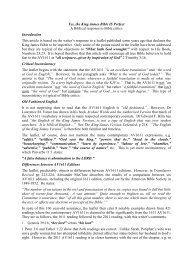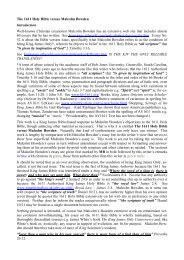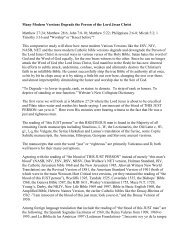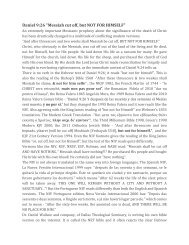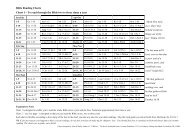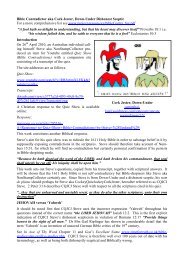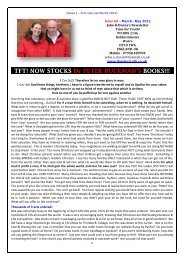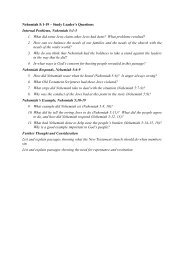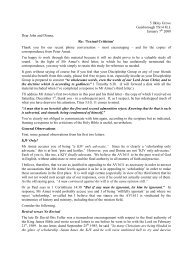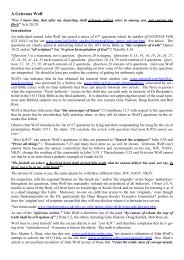"his branch" or "her branch" in Mat. 24:32 & Mk. 13:28 - Time for Truth
"his branch" or "her branch" in Mat. 24:32 & Mk. 13:28 - Time for Truth
"his branch" or "her branch" in Mat. 24:32 & Mk. 13:28 - Time for Truth
Create successful ePaper yourself
Turn your PDF publications into a flip-book with our unique Google optimized e-Paper software.
"<strong>his</strong> branch" <strong>or</strong> "<strong>her</strong> branch" <strong>in</strong> <strong>Mat</strong>. <strong>24</strong>:<strong>32</strong> & <strong>Mk</strong>. <strong>13</strong>:<strong>28</strong><br />
“His branch” <strong>or</strong> “Her branch”?<br />
A man who calls himself Jovial is go<strong>in</strong>g around the <strong>in</strong>ternet clubs post<strong>in</strong>g alleged err<strong>or</strong>s he<br />
th<strong>in</strong>ks he has found <strong>in</strong> the K<strong>in</strong>g James Bible. Here is one of the “err<strong>or</strong>s” he th<strong>in</strong>ks he has found<br />
<strong>in</strong> t<strong>his</strong> great Book of the L<strong>or</strong>d. He posts:<br />
Introduc<strong>in</strong>g Unecessary Gospel Conflicts<br />
Sometimes <strong>in</strong>consistant translation produces conflicts <strong>in</strong> places w<strong>her</strong>e the same text is common<br />
to m<strong>or</strong>e than one place.<br />
One of the most commonly cited reason f<strong>or</strong> renounc<strong>in</strong>g the faith by those who have read the<br />
scriptures daily is contradictions <strong>in</strong> the New Testament. Is the KJV add<strong>in</strong>g unnecessarily to<br />
apostacy by po<strong>or</strong> translations?<br />
Mistranslations, added text, and <strong>in</strong>consistant translat<strong>in</strong>g have all caused the KJV version of the<br />
Gospels to appear to conflict m<strong>or</strong>e than they do.<br />
In <strong>Mat</strong>t <strong>24</strong>:<strong>32</strong> = Mark <strong>13</strong>:<strong>28</strong>, the KJV creates an unecessary conflict w<strong>her</strong>e<br />
<strong>Mat</strong>t <strong>24</strong>:<strong>32</strong> = "...when <strong>his</strong> branch..." (KJV) while<br />
Mark <strong>13</strong>:<strong>28</strong> = "...when <strong>her</strong> branch..." (KJV)<br />
Yet <strong>in</strong> the Greek, both verses read "authV", which is fem<strong>in</strong><strong>in</strong>e, and thus both should read "<strong>her</strong>",<br />
not "<strong>his</strong>" ! So <strong>in</strong> the Greek, <strong>Mat</strong>t <strong>24</strong>:<strong>32</strong> = Mark <strong>13</strong>:<strong>28</strong> perfectly f<strong>in</strong>e, but the KJV mistranslates<br />
"<strong>her</strong>" <strong>in</strong> <strong>Mat</strong>t <strong>24</strong>:<strong>32</strong> as "<strong>his</strong>". T<strong>his</strong> pronoun replaces the w<strong>or</strong>d "fig tree (thV sukhV)", which is<br />
fem<strong>in</strong><strong>in</strong>e, add<strong>in</strong>g confirmation that t<strong>his</strong> should be "<strong>her</strong>", not "<strong>his</strong>". (End of comments by Jovial)<br />
In <strong>Mat</strong>t <strong>24</strong>:<strong>32</strong> = Mark <strong>13</strong>:<strong>28</strong>, the KJV creates an unecessary conflict w<strong>her</strong>e<br />
• <strong>Mat</strong>t <strong>24</strong>:<strong>32</strong> = "...when <strong>his</strong> branch..." (KJV) while<br />
• Mark <strong>13</strong>:<strong>28</strong> = "...when <strong>her</strong> branch..." (KJV)<br />
Now to address t<strong>his</strong> example -<br />
The man who makes these comments does not himself believe that ANY Bible <strong>in</strong> ANY language<br />
IS <strong>or</strong> ever was the complete, <strong>in</strong>spired and 100% <strong>his</strong>t<strong>or</strong>ically true w<strong>or</strong>ds of God. He has made <strong>his</strong><br />
own m<strong>in</strong>d and personal op<strong>in</strong>ions to be <strong>his</strong> “f<strong>in</strong>al auth<strong>or</strong>ity” (subject to change at any moment, of
course) You might also take notice of the fact that our "scholar" has misspelled w<strong>or</strong>ds <strong>her</strong>e even<br />
<strong>in</strong> <strong>his</strong> native English language. He several times misspelled the w<strong>or</strong>ds 'unnecessary' and<br />
'<strong>in</strong>consistent'.<br />
First of all, trees themselves actually ARE eit<strong>her</strong> the female <strong>or</strong> the male of their species, but most<br />
fig trees are BOTH male and female.<br />
T<strong>his</strong> from The Puzzle of the Fig -<br />
http://www.botgard.ucla.edu/html/botanytextbooks/economicbotany/Ficus/<strong>in</strong>dex.html<br />
“Most species of figs <strong>in</strong> the w<strong>or</strong>ld (the genus Ficus has m<strong>or</strong>e than 600 species) are monoecious<br />
and have male and female flowers with<strong>in</strong> a s<strong>in</strong>gle syconium.”<br />
Secondly, when you look at the context of t<strong>his</strong> verse as found <strong>in</strong> the gospels it is clear that the<br />
L<strong>or</strong>d Jesus is not talk<strong>in</strong>g about a specific fig tree, but of the fig tree <strong>in</strong> general. And fig trees, as<br />
well as most trees, do have a male <strong>or</strong> female nature, but the fig tree is both male and female at<br />
the same time. Even if some fig trees were ‘female’ and ot<strong>her</strong>s were ‘male’, t<strong>her</strong>e STILL would<br />
not be an err<strong>or</strong> by referr<strong>in</strong>g to “<strong>her</strong> branch” versus “<strong>his</strong> branch” because we are not referr<strong>in</strong>g to<br />
one specific fig tree as an <strong>in</strong>dividual, but to fig trees <strong>in</strong> general. T<strong>his</strong> Jovial fellow is see<strong>in</strong>g<br />
“err<strong>or</strong>s” w<strong>her</strong>e none exist.<br />
Thirdly, when t<strong>his</strong> Bible c<strong>or</strong>rect<strong>or</strong> who himself does not have n<strong>or</strong> believe that ANY Bible <strong>in</strong><br />
ANY language IS <strong>or</strong> ever was the complete and <strong>in</strong>fallible w<strong>or</strong>ds of God, tells us that the w<strong>or</strong>d f<strong>or</strong><br />
“fig tree” is fem<strong>in</strong><strong>in</strong>e and thus “should read <strong>her</strong>” he reveals both <strong>his</strong> ign<strong>or</strong>ance of languages and<br />
how he has placed <strong>his</strong> own m<strong>in</strong>d and understand<strong>in</strong>g as <strong>his</strong> “f<strong>in</strong>al auth<strong>or</strong>ity”, because most ot<strong>her</strong><br />
translations around today do not agree with him about t<strong>his</strong>. Most modern translations do not say<br />
“<strong>her</strong> branches” at all, but “its branches”, which would be a neuter and not fem<strong>in</strong><strong>in</strong>e n<strong>or</strong><br />
mascul<strong>in</strong>e.<br />
Just because a w<strong>or</strong>d <strong>in</strong> Greek <strong>or</strong> Hebrew <strong>or</strong> Spanish, French, German <strong>or</strong> <strong>in</strong> most of the w<strong>or</strong>ld’s<br />
languages is fem<strong>in</strong><strong>in</strong>e, mascul<strong>in</strong>e <strong>or</strong> even neuter, has noth<strong>in</strong>g to do with whet<strong>her</strong> <strong>or</strong> not the object<br />
itself is “fem<strong>in</strong><strong>in</strong>e” <strong>or</strong> “mascul<strong>in</strong>e”. F<strong>or</strong> example, the Greek w<strong>or</strong>ds f<strong>or</strong> “sw<strong>or</strong>d, hour, city, vict<strong>or</strong>y,<br />
wood and fox” are all fem<strong>in</strong><strong>in</strong>e. The w<strong>or</strong>ds “w<strong>or</strong>ld, m<strong>in</strong>d, air, foot and h<strong>or</strong>se” are all mascul<strong>in</strong>e.<br />
Does t<strong>his</strong> mean that all sw<strong>or</strong>ds and foxes are female and all feet and h<strong>or</strong>ses are male? Or course<br />
not. Greek and several ot<strong>her</strong> w<strong>or</strong>ld languages also have a neuter gender. W<strong>or</strong>ds like “even<strong>in</strong>g,<br />
light, milk, bird and fowl” are all neuter. Does t<strong>his</strong> mean that all birds are without a sexual<br />
nature? Of course not.
Or if we look at the Spanish language (which I personally enjoy very much) we see that the<br />
w<strong>or</strong>ds f<strong>or</strong> spoon (la cuchara) and table (la mesa) are fem<strong>in</strong><strong>in</strong>e but the w<strong>or</strong>ds f<strong>or</strong> f<strong>or</strong>k (el tened<strong>or</strong>)<br />
and dress (el vestido) are mascul<strong>in</strong>e. Does t<strong>his</strong> mean that all spoons and tables are female but all<br />
f<strong>or</strong>ks and dresses are males? Once aga<strong>in</strong>, of course not. T<strong>his</strong> Bible critic is show<strong>in</strong>g <strong>his</strong><br />
ign<strong>or</strong>ance of how languages w<strong>or</strong>k from the get go.<br />
Let’s take a closer look at not only the K<strong>in</strong>g James Bible, but ot<strong>her</strong> translations as well to see<br />
how they handle t<strong>his</strong> matter when referr<strong>in</strong>g to trees. The K<strong>in</strong>g James Bible as well as several<br />
earlier translations and some modern ones as well often refer to trees and ot<strong>her</strong> th<strong>in</strong>gs as “<strong>her</strong>,<br />
<strong>his</strong>, <strong>or</strong> its”. The K<strong>in</strong>g James Bible does all three.<br />
<strong>Mat</strong>thew <strong>24</strong>:<strong>32</strong><br />
HER - ASV - Now from the fig tree learn <strong>her</strong> parable: when <strong>her</strong> branch, also Rot<strong>her</strong>ham's<br />
Emphasized bible 1902, the Bible <strong>in</strong> Basic English 1961, Emphatic Diaglott New Testament,<br />
Updated Bible Version 2004.<br />
ITS - ESV - "From the fig tree learn its lesson: as soon as its branch, as well as NASB, NIV,<br />
NKJV<br />
HIS - the K<strong>in</strong>g James Bible, the Bishops' Bible 1568, Coverdale's Bible 1535, Tyndale's N.T.<br />
1525, Wycliffe's Bible <strong>13</strong>95 - "Whanne <strong>his</strong> braunche is now tendir", English Jubilee Bible 2000,<br />
Mark <strong>13</strong>:<strong>28</strong><br />
HER - Geneva Bible 1587 - "When <strong>her</strong> bough is yet tender, and it br<strong>in</strong>geth fo<strong>or</strong>th leaues, K<strong>in</strong>g<br />
James Bible 1611, Revised Version 1881, ASV 1901, W<strong>his</strong>tone’s New Testament, Rot<strong>her</strong>ham's<br />
Emphasized Bible 1902 - "When, already, <strong>her</strong> young branch, becometh tender, Updated Bible<br />
Version 2003,<br />
ITS - NKJV, NIV, NASB, RSV, ESV<br />
HIS - Wycliffe Bible <strong>13</strong>95 - “Whanne now <strong>his</strong> braunche is tendre”, Tyndale 1525 - "When <strong>his</strong><br />
braunches are yet tender", Coverdale 1535 -"Wha <strong>his</strong> braunch is yet teder,", Bishops' Bible 1568<br />
THE - Young's - "when THE branch may already become tender, Hebrew Names Version,<br />
Douay-Rheims 1582, New Life Bible 1969<br />
Ot<strong>her</strong> Verses about the Fig tree<br />
Song of Solomon 2:<strong>13</strong> - The fig tree putteth f<strong>or</strong>th HER green figs, and the v<strong>in</strong>es with the tender
grape give a good smell. Arise, my love, my fair one, and come away.<br />
Hosea 9:10 I found Israel like grapes <strong>in</strong> the wilderness; I saw your fat<strong>her</strong>s as the firstripe <strong>in</strong> the<br />
fig tree at HER first time: but they went to Baalpe<strong>or</strong>, and separated themselves unto that shame;<br />
and their abom<strong>in</strong>ations were acc<strong>or</strong>d<strong>in</strong>g as they loved.<br />
Joel 2:22 - Be not afraid, ye beasts of the field: f<strong>or</strong> the pastures of the wilderness do spr<strong>in</strong>g, f<strong>or</strong><br />
the tree beareth HER fruit, the fig tree and the v<strong>in</strong>e do yield their strength.<br />
Revelation 6:<strong>13</strong> -And the stars of heaven fell unto the earth, even as a fig tree casteth <strong>her</strong><br />
untimely figs, when SHE is shaken of a mighty w<strong>in</strong>d.<br />
Trees themselves are sometimes characterized as mascul<strong>in</strong>e and sometimes as fem<strong>in</strong><strong>in</strong>e. In fact,<br />
t<strong>his</strong> IS the nature of most trees God has made. Trees are also sometimes referred to <strong>in</strong> the K<strong>in</strong>g<br />
James Bible as “it”. All three uses of “<strong>his</strong>” <strong>or</strong> “<strong>her</strong>” <strong>or</strong> “its” are perfectly accurate and t<strong>her</strong>e are<br />
no contradictions, as t<strong>his</strong> Bible critic imag<strong>in</strong>es.<br />
Genesis 1:11 -And God said, Let the earth br<strong>in</strong>g f<strong>or</strong>th grass, the <strong>her</strong>b yield<strong>in</strong>g seed, and the fruit<br />
tree yield<strong>in</strong>g fruit after HIS k<strong>in</strong>d, whose seed is <strong>in</strong> ITSELF, upon the earth: and it was so.<br />
Genesis 2:17 -But of the tree of the knowledge of good and evil, thou shalt not eat of IT: f<strong>or</strong> <strong>in</strong><br />
the day that thou eatest t<strong>her</strong>eof thou shalt surely die.<br />
Psalm 1:3 - And he shall be like a tree planted by the rivers of water, that br<strong>in</strong>geth f<strong>or</strong>th HIS fruit<br />
<strong>in</strong> <strong>his</strong> season; HIS leaf also shall not wit<strong>her</strong>; and whatsoever he doeth shall prosper.<br />
Song of Solomon 2:3 As the apple tree among the trees of the wood, so is my beloved among the<br />
sons. I sat down under HIS shadow with great delight, and HIS fruit was sweet to my taste.<br />
Song of Solomon 2:<strong>13</strong> - The fig tree putteth f<strong>or</strong>th HER green figs, and the v<strong>in</strong>es with the tender<br />
grape give a good smell. Arise, my love, my fair one, and come away.<br />
Jeremiah 17:8 -F<strong>or</strong> he shall be as a tree planted by the waters, and that spreadeth out HER roots<br />
by the river, and shall not see when heat cometh, but HER leaf shall be green;<br />
Ezekiel 31:8 -The cedars <strong>in</strong> the garden of God could not hide him: the fir trees were not like HIS<br />
boughs, and the chesnut trees were not like HIS branches; n<strong>or</strong> any tree <strong>in</strong> the garden of God was<br />
like unto him <strong>in</strong> <strong>his</strong> beauty.
Ezekiel 34:27 - And the tree of the field shall yield HER fruit, and the earth shall yield HER<br />
<strong>in</strong>crease,<br />
Daniel 4:14 - He cried aloud, and said thus, Hew down the tree, and cut off HIS branches, shake<br />
off <strong>his</strong> leaves, and scatter HIS fruit: let the beasts get away from under it, and the fowls from HIS<br />
branches:<br />
Hosea 9:10 - I found Israel like grapes <strong>in</strong> the wilderness; I saw your fat<strong>her</strong>s as the firstripe <strong>in</strong> the<br />
fig tree at HER first time:<br />
Hosea 14:6 -HIS branches shall spread, and HIS beauty shall be as the olive tree, and HIS smell<br />
as Lebanon.<br />
<strong>Mat</strong>thew 12:33 -Eit<strong>her</strong> make the tree good, and HIS fruit good; <strong>or</strong> else make the tree c<strong>or</strong>rupt, and<br />
HIS fruit c<strong>or</strong>rupt: f<strong>or</strong> the tree is known by HIS fruit.<br />
Luke 6:44 -F<strong>or</strong> every tree is known by HIS own fruit. F<strong>or</strong> of th<strong>or</strong>ns men do not gat<strong>her</strong> figs, n<strong>or</strong><br />
of a bramble bush gat<strong>her</strong> they grapes.<br />
Revelation 22:2 -In the midst of the street of it, and on eit<strong>her</strong> side of the river, was t<strong>her</strong>e the tree<br />
of life, which bare twelve manner of fruits, and yielded HER fruit every month: and the leaves of<br />
the tree were f<strong>or</strong> the heal<strong>in</strong>g of the nations.<br />
Now, let’s sum up the argument once aga<strong>in</strong>.<br />
“Now learn a parable of the fig tree; When <strong>his</strong> branch is yet tender, and putteth f<strong>or</strong>th leaves, ye<br />
know that summer is nigh.” <strong>Mat</strong>thew <strong>24</strong>:<strong>32</strong><br />
When you look at the context of t<strong>his</strong> verse as found <strong>in</strong> the gospels it is clear that the L<strong>or</strong>d Jesus is<br />
not talk<strong>in</strong>g about a specific fig tree, but of the fig tree <strong>in</strong> general. And fig trees, as well as most<br />
trees, do have a male <strong>or</strong> female nature, but the fig tree is both male and female at the same time.<br />
Even if some fig trees were ‘female’ and ot<strong>her</strong>s were ‘male’, t<strong>her</strong>e STILL would not be an err<strong>or</strong><br />
by referr<strong>in</strong>g to “<strong>her</strong> branch” versus “<strong>his</strong> branch” because we are not referr<strong>in</strong>g to one specific fig<br />
tree as an <strong>in</strong>dividual, but to fig trees <strong>in</strong> general. T<strong>his</strong> Jovial fellow is see<strong>in</strong>g “err<strong>or</strong>s” w<strong>her</strong>e none<br />
exist. The K<strong>in</strong>g James Bible is always right. Accept no substitutes.<br />
All of grace, believ<strong>in</strong>g the Book, Will K<strong>in</strong>ney



